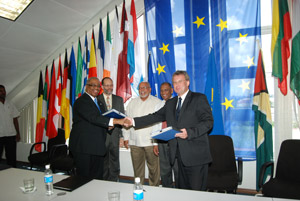THE European Union (EU) and the Inter-American Institute for Cooperation on Agriculture (IICA) yesterday signed an agreement worth 8.6M euros for an agricultural policy programme with focus on the Caribbean,
including Guyana.
Speaking at the function, held in the EU Georgetown office, President Donald Ramotar acknowledged that the  benefactor grouping has been playing a significant role in assisting the Caribbean and the African, Caribbean and Pacific (ACP) countries.
benefactor grouping has been playing a significant role in assisting the Caribbean and the African, Caribbean and Pacific (ACP) countries.
He said the Union has been working with the Caribbean Forum (CARIFORUM) and the ACP in assisting various countries to improve their food security and quality of life.
The Guyanese Head of State, who has responsibility for agriculture in the Caribbean Community (CARICOM) quasi Cabinet, emphasised that the region has great potential in this regard, noting that it can contribute, tremendously, to creating jobs, not only directly in the field but in many other related areas, as well.
He said,“Agriculture is taking on an even greater importance in our t ime. It has always been important but it is becoming even more important in our time, largely because the production of food is competing with many other things.”
ime. It has always been important but it is becoming even more important in our time, largely because the production of food is competing with many other things.”
Mr. Ramotar maintained that the Region has great capacity that until now has been heavily under-utilised. He added that, if the country makes use of this capacity, it can make a greater contribution to Guyana’s food security, as well as that of the Caribbean and the wider world.
He observed, further, that Caribbean countries have huge food importation bills and while the developing ones spend US$66 per capita on imports, the Caribbean expends approximately US$500 per capita.
Huge markets
President Ramotar said there are huge markets for food that can be satisfied by countries within the Region which would contribute to the reduction of import bills, noting that the money saved can then be utilised in other important areas.
Ambassador Robert Kopecky, who was the EU signatory, advised that the Intra-ACP Agriculture Policy Project will be implemented over the next 45 months.
He explained that it is meant to increase the capability of Regional agricultural development organisations within the Caribbean in order to address the development needs of small holders.
Mr. Kopecky related that the promotion and development of small holders’ agriculture will allow closer integration into local, national, Regional and global markets, which would result in diversified production and sustainable food security.
He said that IICA was selected to implement this scheme on behalf of the CARIFORUM nations, since it is recognised as one of the premier organisations involved in agriculture, both at the technical and community levels.
However, while IICA is a party to the agreement, the CARICOM Secretariat and the Caribbean Agricultural Research and Development Institute (CARDI) will also be major players responsible for technical guidance and implementation, the envoy said.
Additionally, he said that other institutions will be involved, such as the Ministries of Agriculture, tertiary agricultural educational entities within CARIFORUM and the Caribbean Farmers Network (CaFAN), among others.
The diplomat said the EU expects to see, at the end of the project, improvements in the policy regimes and incentive schemes for small holders in food security at Regional, national and local levels and in the capacity of Regional agricultural institutions.
CARICOM Secretary General, Mr. Irwin La Rocque, was also at the signing and related that the overall Intra-ACP Programme has a financial envelope of 20 million euros provided by the EU, from which the 8.6 million have been allocated for the Caribbean programme.
Continued commitment
“This programme exemplifies the strength of the partnership between IICA and the CARICOM/CARIFORUM Secretariat as IICA implements this activity on behalf of CARIFORUM. It also reflects the continued commitment of the European Union to the on-going development of our Region,” he said.
La Rocque said CARIFORUM, in its capacity as the ultimate beneficiary of the programme, has inked a memorandum of understanding with IICA, which will complement efforts aimed at getting the best results out of this programme.
He said the implementation of it comes at a time of significant challenges for the Caribbean in general and, in particular, the 16 CARIFORUM States.
“It is a time when our states have no choice but to improve their competitiveness, with a view to achieving greater economic viability and sustainability. That competitiveness would put us in good stead as we seek to take advantage of the Economic Partnership Agreement (EPA) with the European Union,” he remarked.
La Rocque said the content of the programme has been informed by the agriculture sector development issues of CARICOM’s Liliendaal Declaration and the Jagdeo Initiative on the nine key binding constraints to agricultural development, as well as the key objectives of the sector as outlined in the Revised Treaty of Chaguaramas.
Policy instruments
In addition, he stated that it has also benefited from several CARICOM policy instruments including the Community Agricultural Policy; the Regional Food and Nutrition Security Policy and Action Plan; the Common Fisheries Policy; the Agri-business Strategy; the Draft Community Industrial Policy and the Draft Biotechnology Policy.
La Rocque, who is CARIFORUM Secretary General, as well, confirmed that the project would also improve food security by increasing production and productivity of selected commercially and nutritionally valuable agricultural produce.
Meanwhile, IICA representative in Trinidad and Tobago, Mr. Gregg Rawlins affixed his signature on behalf of the institution and agreed that the programme is designed, specifically, to address the developmental needs of the numerous small farmers and small processors in CARIFORUM countries.
He said, although the EU is no stranger to the agriculture and rural development landscape in the Caribbean, in the history of its engagements, this Caribbean Regional Programme in Agriculture could be considered unique for a number of reasons.
First, it is crafted as a multi-dimensional programme that seeks to tackle inter-connected policy and technical issues related to an enabling policy and institutional environment, appropriate research, technology and innovation and market development, all to focus on small producers.
In addition, he said it seeks to build on and requires close, institutional partnerships, which also fosters an environment to extend the partnership to other public agencies and private sector organisations including farmers’ networks and other international and Regional developmental partners.
Rawlins said the programme also recognises the need to strengthen the institutional environment that supports the agricultural development process and adds value to the Regional level through options aimed at enhancing capacity to implement Regional initiatives.



.jpg)








